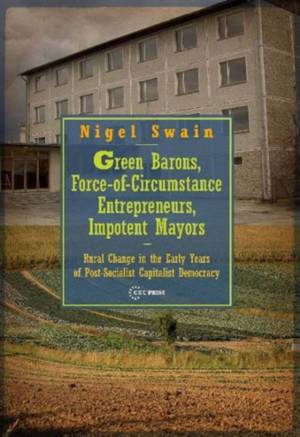
- Afhalen na 1 uur in een winkel met voorraad
- Gratis thuislevering in België vanaf € 30
- Ruim aanbod met 7 miljoen producten
- Afhalen na 1 uur in een winkel met voorraad
- Gratis thuislevering in België vanaf € 30
- Ruim aanbod met 7 miljoen producten
Zoeken
Green Barons, Force-Of-Circumstance Entrepreneurs, Impotent Mayors
Rural Change in the Early Years of Post-Socialist Capitalist Democracy
Nigel Swain
Hardcover | Engels
€ 121,95
+ 243 punten
Omschrijving
An exemplary study in comparative contemporary history, this monograph looks at rural change in six countries: Bulgaria, Czech Republic, Hungary, Poland, Romania and Slovakia. In the 1990s most of these nations experienced a fourth radical restructuring of agricultural relations in the twentieth century, and all went through the dramatic transition from communism to capitalism. The author analyzes attempts to activate democracy on a local level and recreate farming structures and non-agricultural businesses based on private ownership and private enterprise. He describes the emergence of a new business class that seeks to dominate local government structures; the recuperation of former communist farming entities by former managers; and the transformation of peasants into rural citizens, who nevertheless remain the underdogs. Swain exposes common features as well as specific divergences between the six countries; he portrays the winners, losers and engineers of transformations. He situates his themes in a wider context that will appeal to a broad range of social scientists and historians.
Specificaties
Betrokkenen
- Auteur(s):
- Uitgeverij:
Inhoud
- Aantal bladzijden:
- 412
- Taal:
- Engels
Eigenschappen
- Productcode (EAN):
- 9786155225703
- Verschijningsdatum:
- 15/02/2014
- Uitvoering:
- Hardcover
- Formaat:
- Genaaid
- Afmetingen:
- 163 mm x 231 mm
- Gewicht:
- 748 g

Alleen bij Standaard Boekhandel
+ 243 punten op je klantenkaart van Standaard Boekhandel
Beoordelingen
We publiceren alleen reviews die voldoen aan de voorwaarden voor reviews. Bekijk onze voorwaarden voor reviews.











